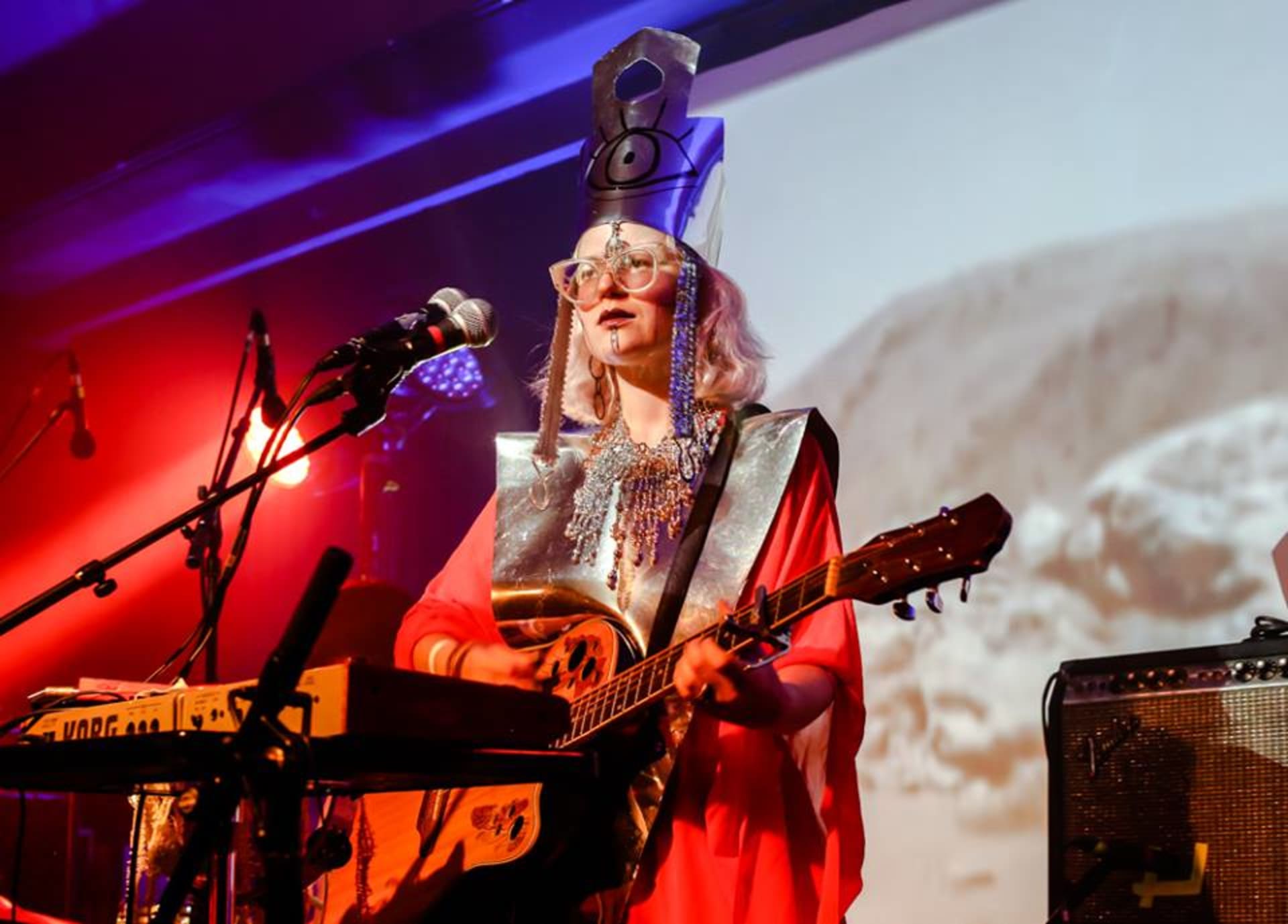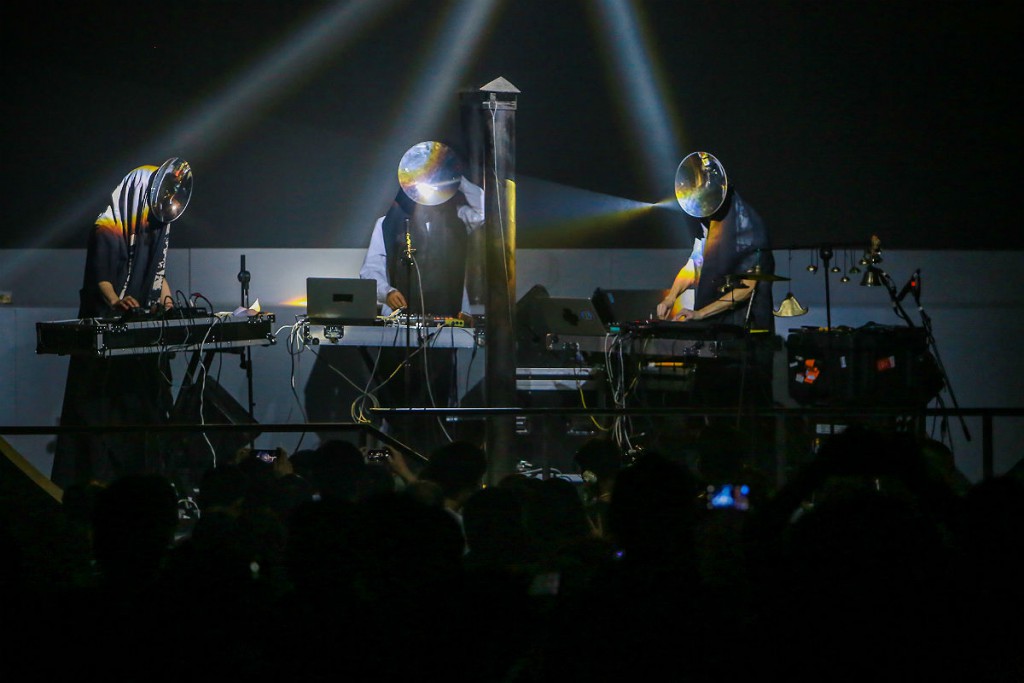
Can A Festival Save A City? Pop-Kultur Reviewed
What’s musical soul? How does it relate to the soul of a city? I don’t know. But many of the acts performing in the Pop-Kultur Festival, a three day-into-night Berghain-based event funded by Musicboard, Berlin’s government liaison to the music industry, appeared to be yearning for it. Festival attendees had the privilege of watching numerous current-ish acts rouse a sense of emotion from the last several decades, and it felt like a soul-futurist response to a discontent with The Now.
During his schoolmarmish set, clever-clever sample-fiend Matthew Herbert attempted to stir the dying hopes of the early eighties, with singers garbed and emoting out of an uncanny 1981 Talking Heads-meets-Grace Jones fever dream. Ebony Bones fronted a London R&B review, though her all-over-the-place sound and camp touches—including backing dancers with fake afros abstracted into face-obscuring mums in bloom—felt closer to the house-loving punk of Detroit’s The Dirtbombs than Motown. Neneh Cherry, the festival’s most notable act, has been on the comeback trail, and despite attempts to update her sound, was very much the Neneh Cherry we remember from the turn of the ’90s. Current DFA flagship The Juan MacLean, on the other hand, boasted a multi-gendered take on several decades of NYC style that managed to successfully absorb all of the influences of the previously mentioned acts.
It fit Berlin to a T, as the city struggles to find—or at least market—its cultural soul. Indeed, paranoia has permeated the Berlin music scene and its helplessness in the face of encroaching neoliberal economic trends. Mark its origins around the time that Neukölln tenements started selling for more money than Croatian beachfront property. The back and forth of the discussion surrounding culture in Berlin is more a reflection of the usual ideological ping-pong than an attempt to ascertain what the issue is—and more importantly, whether there really is an issue. Clubs are closing, but aren’t new ones opening? The players are penniless, but aren’t musicians usually broke? There’s nothing new. Where in this Internet-razed world is the new? Berlin has a lot of problems, but it wouldn’t appear that a lack of music would be one of them, as it’s managed to maintain the strongest nightlife scene of any major city. Ultimately, those ping-pong players may, as with the tennis match at the end of Antonioni’s Blow Up, be mimes.
Still, who might resist The Shout of the Mime? Berlin likes government-based solutions, and I can’t blame it, as that, pax Sutton’s Law, is where the money is. Previous attempts at state funded music festivals failed to inspire: Popkomm, the city’s former pop music trade show, had the misfortune of moving from Cologne to Berlin during the acceleration of the music industry’s decline—but at least visitors got to hang out at a Nazi-built airport. Its replacement from 2010 to 2014 was Berlin Music Week, an amorphous, multi-venued polyglot of panels and minor bands that pleased no one. (One major player in Pop-Kultur expressed a pleasure in having had a small hand in killing it.) Of course, Berlin’s lack of financial opportunity is the major push-me-pull-you of its internal culture: Where there’s no money, nothing can thrive. When there is money, the city gets sold out from under you . . . and nothing can thrive.
Enter into this paradox a 660,000€ festival funded by both the city and the E.U., featuring performances, seminars for aspiring musicians and music journalists, and DJ gigs. The idea of Pop-Kultur was to serve as a bridge between official and underground culture, at least in part to save the one and bolster the other. But can a festival really help save a city? To a hammer—or a promoter—everything looks like a nail —or a concert. A successful festival only perpetuates itself, and success is gauged by the enjoyment and financial success of the experience and not its long-term effects. That may be why so many of these performers had little to do with Berlin in particular. And there’s the rub of the Musicboard endeavor: If the government’s money were to be put to use in ways that would benefit and expand Berlin’s musical environment, it could perhaps end up at odds with the Senate’s ultimate goal of selling the city. Here’s where the fears of selling out and selling off become real.
What about matching the money spent on such an ambitious festival with money for top-flight tenant attorneys, zoning lobbyists and tax accounts who would work to ensure that Berlin’s venues had a fighting chance against developers, interlopers and their own financial stupidities? I suspect that would stymie the government’s primary concern, which is a palliative that would stop all the bitching while using the “hip” image of Berlin to attract the investors who would, in the end, raze Berghain if they could. Or they would keep Berghain (by now a considerable and still excellent institution, but one that doesn’t need the federal swag) as a jewel in the crown while starving the players beneath, much as the hated Mayor Giuliani attempted to do to the culture makers of New York City during the 1990’s? Pop-Kultur doesn’t do a whit to prevent the modes of gentrification that are Berlin’s paramount problem, but I suppose that can’t really be its intention.

Pantha Du Prince feat. The Triad
So what did we get? A festival in which the Pop justified and was justified by the Kultur. Berghain has rarely witnessed so many trombones. There appeared to be a break between two generations. Slightly older acts equated ambition with size. Aside from the aforementioned Herbert performance, CocoRosie’s Bianca Cassidy reinforced the sentimental aspects of the fifties beatnik tradition with her current Tom Waits meets Lykke Li act, while Pantha Du Prince debuted music developed during Musicboard retreats. His triad looked like The Nairobi Trio as reimagined by I-D Magazine. If you believe bigger equals better, then Owen Pallett’s semi-orchestral collaboration with Stargaze was probably the most successful example.
And then there were younger acts, raised with fewer resources and expectations, who attempted to work smaller but think conceptually, usually in a heavily self-referential style. It befit those raised by the Internet. The music became a gesture representing itself. The problem with this approach is that the sounds risk becoming dated fast. 18+’s narcotized art-school take on hip-hop sex tropes strikes more of a snapshot of the concerns of 2013 turning into 2014, in much the same way Butthole Surfers conjure up 1986. Post-FKA Twigs, it’s the stuff of also-rans, as are the theatrical aggressions of HO99O9. Watching 18+ face one another backstage as they stared into their phones was a more succinct expression of their aesthetic than their performance. More promising was the John Zorn-like ability of Inga Copeland to unite disparate influences through her dubstep-inflected sound, as well as the miniaturist James Pants, whose Asperger’s shtick almost seemed a mockery of Herbert’s need to lecture. Pants introduced one piece with the words, “This song is only eight notes. It’s the same thing over and over again and very fun.” Which is to say he captured the essence of rock and roll.
Consequently, the most beguiling act I witnessed was also the most au courant and the final non-DJ set of the festival: Kero Kero Bonito (KKB). With trends slipping by so quickly, I felt nostalgia for their concerns even as I was empathizing with them. The London trio is loosely affiliated with the Situationist pop umbrella PC Music, with their co-producer Kane West DJing at Popkultur the night before. And like PC Music, KKB feels very 2015 in its desire to mock emptiness while yearning for its benefits. Sporting fake eyelashes and garbed in pink latex, vocalist Sarah Midori Perry bounced through a set of semi-parodic J-Pop exhortations that seemed exhausting. How did she keep that smile on her face for 45 minutes while looking as shiny as an AI anime just exposed to its self-consciousness? 20 years ago, this sort of faux-naif behavior would be taken at its word—think Cibo Matto. Today, it’s ambiguous enough to be viewed as either the apocalypse or our respite from it. “Now I know what’s real/And what is fake,” Sarah Midori Perry sings in “I’d Rather Sleep”. But do we know what’s Pop and what’s Kultur?
Cover photo of Mary Ocher by Roland Owsnitzki courtesy of Pop-Kultur’s Facebook.
Published September 04, 2015.
